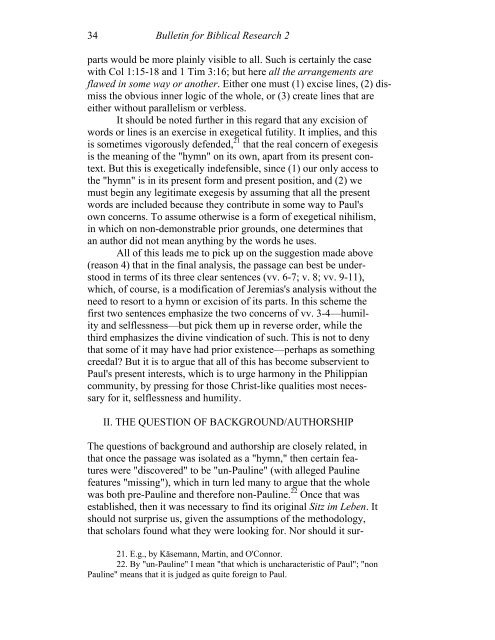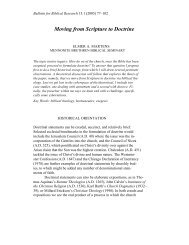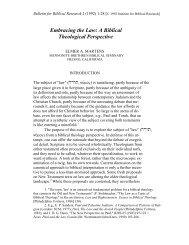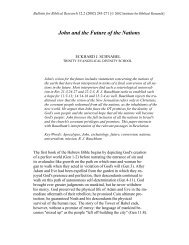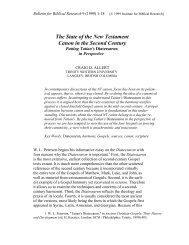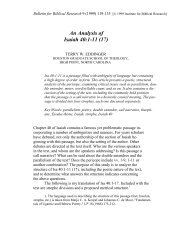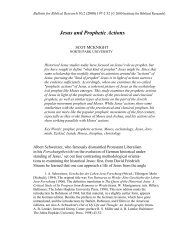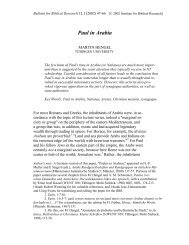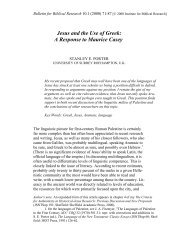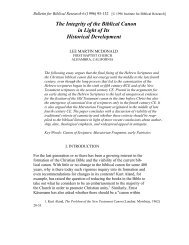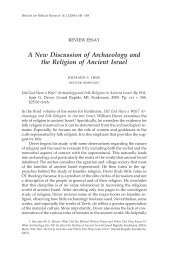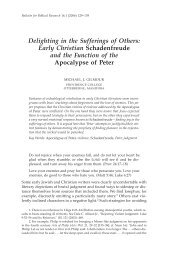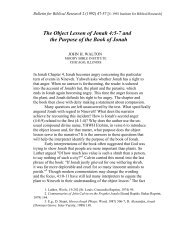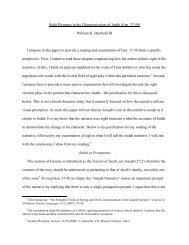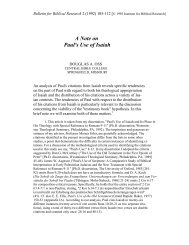Philippians 2:5-11: Hymn or Exalted Pauline Prose? - Institute for ...
Philippians 2:5-11: Hymn or Exalted Pauline Prose? - Institute for ...
Philippians 2:5-11: Hymn or Exalted Pauline Prose? - Institute for ...
You also want an ePaper? Increase the reach of your titles
YUMPU automatically turns print PDFs into web optimized ePapers that Google loves.
34 Bulletin f<strong>or</strong> Biblical Research 2<br />
parts would be m<strong>or</strong>e plainly visible to all. Such is certainly the case<br />
with Col 1:15-18 and 1 Tim 3:16; but here all the arrangements are<br />
flawed in some way <strong>or</strong> another. Either one must (1) excise lines, (2) dismiss<br />
the obvious inner logic of the whole, <strong>or</strong> (3) create lines that are<br />
either without parallelism <strong>or</strong> verbless.<br />
It should be noted further in this regard that any excision of<br />
w<strong>or</strong>ds <strong>or</strong> lines is an exercise in exegetical futility. It implies, and this<br />
is sometimes vig<strong>or</strong>ously defended, 21 that the real concern of exegesis<br />
is the meaning of the "hymn" on its own, apart from its present context.<br />
But this is exegetically indefensible, since (1) our only access to<br />
the "hymn" is in its present f<strong>or</strong>m and present position, and (2) we<br />
must begin any legitimate exegesis by assuming that all the present<br />
w<strong>or</strong>ds are included because they contribute in some way to Paul's<br />
own concerns. To assume otherwise is a f<strong>or</strong>m of exegetical nihilism,<br />
in which on non-demonstrable pri<strong>or</strong> grounds, one determines that<br />
an auth<strong>or</strong> did not mean anything by the w<strong>or</strong>ds he uses.<br />
All of this leads me to pick up on the suggestion made above<br />
(reason 4) that in the final analysis, the passage can best be understood<br />
in terms of its three clear sentences (vv. 6-7; v. 8; vv. 9-<strong>11</strong>),<br />
which, of course, is a modification of Jeremias's analysis without the<br />
need to res<strong>or</strong>t to a hymn <strong>or</strong> excision of its parts. In this scheme the<br />
first two sentences emphasize the two concerns of vv. 3-4—humility<br />
and selflessness—but pick them up in reverse <strong>or</strong>der, while the<br />
third emphasizes the divine vindication of such. This is not to deny<br />
that some of it may have had pri<strong>or</strong> existence—perhaps as something<br />
creedal? But it is to argue that all of this has become subservient to<br />
Paul's present interests, which is to urge harmony in the Philippian<br />
community, by pressing f<strong>or</strong> those Christ-like qualities most necessary<br />
f<strong>or</strong> it, selflessness and humility.<br />
II. THE QUESTION OF BACKGROUND/AUTHORSHIP<br />
The questions of background and auth<strong>or</strong>ship are closely related, in<br />
that once the passage was isolated as a "hymn," then certain features<br />
were "discovered" to be "un-<strong>Pauline</strong>" (with alleged <strong>Pauline</strong><br />
features "missing"), which in turn led many to argue that the whole<br />
was both pre-<strong>Pauline</strong> and theref<strong>or</strong>e non-<strong>Pauline</strong>. 22 Once that was<br />
established, then it was necessary to find its <strong>or</strong>iginal Sitz im Leben. It<br />
should not surprise us, given the assumptions of the methodology,<br />
that scholars found what they were looking f<strong>or</strong>. N<strong>or</strong> should it sur-<br />
21. E.g., by Käsemann, Martin, and O'Conn<strong>or</strong>.<br />
22. By "un-<strong>Pauline</strong>" I mean "that which is uncharacteristic of Paul"; "non<br />
<strong>Pauline</strong>" means that it is judged as quite f<strong>or</strong>eign to Paul.


